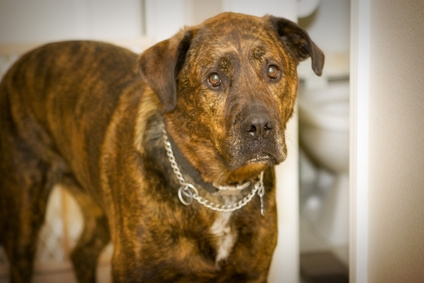Halitosis, or bad breath, is as an offensive odor a majority of dog owners begrudge. Bad breath in dogs is a common pet smell gripe. Reasons are often relevant to the plaque on the teeth and gums and fortunately are rarely a manifestation of other more severe diseases. Plaque speedily hardens and results in in the build up of calculus on the teeth and this is the main cause of gum inflammation. This develops to some extent in all dogs over the age of 2.
A dog's oral cavity sustains an eco-system of bacteria. The most frequent cause of halitosis is the presence of increased amounts of harmful bacteria resulting in periodontal disease. Bacteria are attracted to the tooth surface in just hours of a dog's teeth being cleaned. Within days, the plaque becomes mineralized producing calculus. As plaque ages and gingivitis advances into periodontitis (bone loss), bacteria changes from somewhat irritating strains to bone destroying forms which create hydrogen sulfide inducing halitosis.
Advanced stages of periodontal disease are painful and dogs can endure a great deal of pain. It is important to remember a dog's biology separates between acute pain and long-term pain. Dogs will deliberately try to hide pain from injuries such as broken bones and decaying teeth, this is a survival mechanism remnant from their wolf days protecting them from looking vulnerable to predators. Indicators that your dog is experiencing pain can be difficulties chewing hard food, others may be the dog pawing at their mouths. Unfortunately most will not show any signs.
Halitosis is simply diagnosed by smelling your dog's breath. If there is a unpleasant odor, halitosis is present. If the dog's bad breath continue to persist or progressively becomes worse after the teeth cleaning treatments are performed a veterinarian examination is vital. If the diagnosis is not obvious after oral examination, blood tests will be considered to check for internal disease.
Helpful halitosis treatments vary depending on the cause, this means the severity of the plaque and tarter on the teeth and gums as well as infection. There are 4 recognized stages of periodontal disease. The first two (early gingivitis and advanced gingivitis) are cared for by dog teeth cleaning products made with natural anti-bacterial ingredients, these products are chiefly available directly from online dog nutrition companies. As the disease advances bone loss occurs causing periodontitis which may well require surgery or tooth extraction.
Antibiotics may be used to eliminate periodontal disease causing bacteria. Normally the antibiotics are utilized in a pulse therapy style (given the first five days of each month). Oral
rinses formulated with chlorhexidine are helpful. Odor neutralization of hydrogen sulfide occurs with the use of zinc citrate.
Once the underlying periodontal disease has been taken care of, your dog's halitosis will cease to exist. Nonetheless prevention is always a far superior method for coping with your dog's oral health. Ground breaking approaches to dog health care are no longer confined to the veterinarian profession. Fresh organizations specializing in the nutrition and health of canines are also committed to educating owners on their conclusions. As a end result these enterprises online forums make it feasible for dog owners to discover ground breaking approaches for preventing and treating ailments such as periodontal disease.

 How to Put Muscle Weight on a Dog Fast
How to Put Muscle Weight on a Dog Fast
How to Put Muscle Weight on a Dog Fast
How to Put Muscle Weight on a Dog Fast
 Is Pet Insurance Right for Your Puppy?
Is Pet Insurance Right for Your Puppy?
Is Pet Insurance Right for Your Puppy?
Is Pet Insurance Right for Your Puppy?
 Advice from the Breeder: Tom Coen, Macdega Shetland Sheepdogs
My advice to others over the years
Advice from the Breeder: Tom Coen, Macdega Shetland Sheepdogs
My advice to others over the years
 6 Springtime Safety Tips for Dogs
6 Springtime Safety Tips for Dogs
6 Springtime Safety Tips for Dogs
6 Springtime Safety Tips for Dogs
 Easter Hazards in Dogs
Easter Hazards in Dogs
Easter Hazards in Dogs
Easter Hazards in Dogs